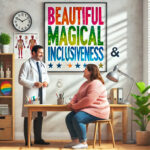Australian families unite to address gaps in eating disorder support system

Australian families unite to address gaps in eating disorder support system
A parent-based organisation is calling for more support for families affected by a loved one living with an eating disorder. In only four years, Eating Disorders Families Australia (EDFA) has fast become a vocal and respected advocate for raising awareness and gaining more support for families. Eating disorders are serious and potentially life-threatening mental illnesses that affect all ages, cultural and socioeconomic groups. Eating disorders deeply impact families, often causing emotional, psychological, and physical distress for many years without respite.
My journey as a peer support caregiver with EDFA began after meeting other parents who also felt alone and frightened for their children’s lives. Our local support group for parents and carers began in Flemington, Victoria in 2016 and a year later, EDFA was formed. Understanding how difficult, frightening, and often confusing supporting a loved one with an eating disorder is, I wanted to become part of EDFA’s lived experience, national, volunteer support network. EDFA is the only Australian organisation solely supporting parents, carers, and siblings of people with eating disorders.
As part of my role with EDFA, I hear daily from families and carers about deficiencies encountered when seeking eating disorder support.
GAPS IN OUR ED SUPPORT SYSTEM
Despite government assistance for new programs and interventions, we cannot ignore the many gaps that remain in the treatment of eating disorders in the Australian health system.
Parents and carers report:
- Being left out of the treatment team due to Australian privacy laws. Leaving carers out of a team is dangerous for people with eating disorders because they are often unaware of their own mental health condition or may not perceive their condition accurately. As a result, they are often unable to make the decisions necessary for their own medical and personal safety.
- A shortage of specialised eating disorder hospital wards to address both mental illness and the eating disorder. When one condition is treated in the absence of the other, treatment often falls short. According to statistics there are 37 public hospital adult eating disorder beds Australia-wide to accommodate more than 1 million Australians who experience eating disorders. Many families report their loved ones are not being admitted unless dangerously compromised; or being discharged early.
- A lack of streamlined protocols around admission to the mental health ward after a suicide attempt and at times being sent home while the person with an eating disorder is still experiencing suicidal ideation.
- Distress due to a perceived lack of compassionate hospital treatment, a lack of understanding and expertise by staff in communication and meal coaching, and a lack of structured support and dissemination of information for parents and carers.
- Many clinicians and general practitioners haven’t had enough experience to accurately diagnose an eating disorder and implement a treatment plan.
- Australian hospital discharge plans appear to be non-mandatory for eating disorders. Families say they are often not given clear guidelines for supporting their loved one at home or for steps to take if their loved one’s situation spirals. There appears to be a lack of step-down services and minimal follow up after hospital discharge.
- Accessing practical help such as professional in-home meal support is almost non-existent for adult loved ones with severe and enduring eating disorders.
- Long wait times for face-to-face and telehealth services, as well as a shortage of inpatient services for loved ones, are frequently reported by carers. Research shows that, depending on where you live, there is a scarcity of specialised therapy and specialists educated to deal with and understand eating disorders. This is compounded for Australians who live in regional, remote and very remote areas.
- Inaccessibility of National Disability Insurance Scheme (NDIS) funding for eating disorders as a stand-alone illness. This is a continuing discussion point within our national carer community. The current NDIS stance is that because eating disorders are not considered a life-long disability they are not eligible for funding; i.e., no matter how chronic and enduring an eating disorder is, there is always the possibility of recovery. However, the expense of treatment, often involving a sizeable team, and sometimes for years, decades and for some, a life-time, is debilitating financially for many families and the individuals themselves, making treatment unaffordable for many. NDIS is only accessible for those with comorbidities such as Obsessive-Compulsive Disorder, Post Traumatic Stress Disorder, anxiety, and depression. Unfortunately, this also often gives the wrong message to the person about the severity of their eating disorder.
WHAT ACTION IS BEING TAKEN?
- EDFA has been facilitating and advocating for families to have access to the support they need since 2017. The gift of shared knowledge, wisdom, compassion, hope and support from carers who have gone before cannot be underestimated. EDFA’s peer-to-peer caregiver community draws strength from one another and continues to grow steadily in number and voice because it’s no surprise that families and carers will do whatever it takes to help save their loved ones.
- Australia had no residential, home-environment, recovery centres until recently. Wandi Nerida, Australia’s first 13-bed residential recovery centre for Australians with an eating disorder, commenced operation in June 2021 to provide a bridge between hospital admission and outpatient care. The federal government has since pledged $70.2 million for the establishment of six residential centres around Australia.
- In June this year, in response to a demand for clinician upskilling, the National Eating Disorders Collaboration (NEDC) has introduced an evidence-based, nationally recognised, and openly available Eating Disorder Core Skills: eLearning for GPs online training program.
- Carer focused for all ages, the “shared table” meal support training program was created by Queensland Eating Disorder Service (QuEDs), Eating Disorders Queensland (EDQ) and the Child and Youth Mental Health Services Eating Disorder Program (CHYMS EDP).
- Victoria, Queensland, Western Australia, and South Australia are offering varying levels of peer mentoring, which has been shown to be beneficial to families and carers.
WHAT ACTIONS NEED TO BE TAKEN?
- Carers need effective and consistent support nationally for people with eating disorders and themselves. Families express the need for a national peer mentor, lived experience program for their loved ones with eating disorders. For connection, healing, and recovery, the lived experience has been shown to be valuable and, in many cases, life-changing.
- Professor Tony Attwood highlighted the need for autism screening upon diagnosis of an eating disorder in his presentation at EDFA’s global Autism & Eating Disorders webinar in February 2021. He also called for professionals from both the autism and eating disorder sectors to come together to learn how to effectively adapt treatment for this population. Research suggests that up to one in four individuals with anorexia nervosa may be on the autism spectrum and don’t respond well to standard eating disorder treatment.
- Australian privacy laws need to be updated to enable parents and carers to participate in the treatment team, with appropriate oversight to ensure patient consent.
- The shortage of specialised eating disorder hospital wards addressing a patient’s mental illness and eating disorder must be addressed sufficiently, to ensure availability and access for the duration required.
- Protocols around admission to the mental health ward after a suicide attempt need to be streamlined to ensure individuals are not sent home while still experiencing suicidal ideation.
- The perceived lack of compassionate hospital treatment must be addressed.
- Hospital staff need to be provided with training in communication skills and meal coaching.
- Structured support and dissemination of information for parents and carers needs to be developed in the hospital setting.
- Hospital discharge plans should be mandatory for eating disorders and families should be given clear guidelines for supporting their loved one at home. They should also be provided with appropriate steps to take if their loved one’s situation spirals.
- Step-down services and follow up after hospital discharge need to be ensured.
- Access to specialised therapy and specialists educated to deal with and understand eating disorders must be addressed so that those living in regional and remote areas are not disadvantaged.
- NDIS funding for eating disorders as a stand-alone illness needs to be available.
EDFA continues to work collaboratively with carers and other stakeholders in the eating disorder space to facilitate and advocate for the implementation of positive change for families and their loved ones.






This addresses all the gaps we have encountered in trying to help our child get well since her diagnosis in 2014.
It is too late to go back now and change the flawed processes that have caused compounded stress and emotional and financial hardship on our family as a result of our D suffering from RAN.
Thank you to the amazing people who have also needed to support their own loved ones for starting this organisation and driving change within the Australian health system and the shortfalls in treatment of ED.
The stigma and shame previously associated with these conditions should be greatly reduced when treatment is targeted and evidence based.
I love the inclusion of an autism assessment upon diagnosis.